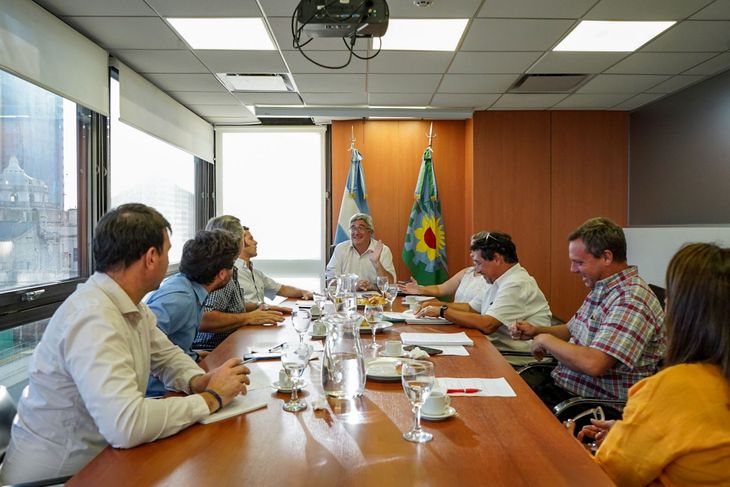Rodríguez, 53 years old, has a degree and doctorate in Economics from the UBA. Before taking office as minister, he was director of the Bachelor’s Degree in Political Economy at the National University of Lanús, researcher at the Center for Social, Economic and Technological Studies (Ceset) and consultant at INTA.
In the public sphere, he served as secretary of Political Institutional Coordination and Agricultural Emergency during Cristina Kirchner’s second term and held positions in the ministries of Agriculture and Economy. He is also a regular adjunct professor at universities such as UNPAZ and the Faculty of Economic Sciences of the UBA.
Javier Rodríguez.jpg
The official is optimistic about the next harvest.
Journalist: How was the harvest performance of this campaign?
Javier Rodríguez: We are having a campaign that climatically recovered after the tremendous drought and returned to normal conditions. We are expecting a good campaign. In some places there were very good results. We expect a good campaign, which recovers the values prior to the drought.
Q: Has this year’s agricultural recovery improved the productive situation?
JR: On the one hand, there is a recovery in produced volumes, mainly due to the climate issue, but which had various difficulties in terms of profitability. The delayed dollar greatly impacts the profitability of productions, especially in medium and small scale producers. On the other hand, there is a shrinking of the domestic market, with a significant reduction in domestic consumption. This affects productions with a strong impact on the domestic market. The climate improvement makes a bit of a difference in terms of what is seen in production volumes, but the difficulties are due to the economic scheme, which has a strong impact on the productive sector.
Q: How do President Javier Milei’s measures impact the Buenos Aires agricultural system?
JR: The first action was the strong devaluation, followed by a very large inflationary process. This caused the effects of the initial devaluation to be reversed in recent months, which is why we are talking about a delayed exchange rate. International prices, especially of grains, fell. Therefore, the situation is complex. It was also at the beginning of the winter campaign, for wheat and barley, a situation of uncertainty for producers because profitability was not very clear. The financing lines that we developed from the province allowed the planted area to be maintained and grow slightly. But there was a difficulty. In other productions, the impact has to do with the reduction of consumption. We are at historical absolute minimum consumption in beef consumption. This has an impact on the prices of livestock regardless of whether exports have grown. The greater incidence of the domestic market in cattle farming ends up resulting in this situation. With this model, the financial sector wins. What is operating is this true financial cycle or carry trade. When we look at the productive sectors, the scenario is different. There is a sector that has good profits even in adverse contexts for production. The most concentrated sectors tend to have a greater difference in results, they can expand their activity in the face of the decline of the medium and smaller ones.
Q: What are the main policies implemented by the ministry to sustain and strengthen agricultural production?
JR: We have the concept that what is important is production with producers, that is why we need large, medium and small producers. Based on that, we generate different programs. There is a very strong financing, trying to reach all strata of producers; There is a policy of differentiation in tax matters, in which smaller producers pay proportionally less; and a policy to promote activity such as the Venereal Disease Prevention Plan for Bovines, and plans linked to the quality of wheat to boost primary activity. Another key element is financing to transform raw materials into food, which is the real challenge of production.
Q: Does the installation of Regional Markets contribute to lower consumer prices?
JR: Yes, with the Buenos Aires Markets program we are managing to connect many producers more directly with consumers. By shortening this marketing chain, there are better prices. We are surveying prices against traditional chains and we are 21% lower. This allowed 2,300 producers – agricultural, beekeeping, horticultural, SMEs or cooperatives – to directly sell their production. The program grew a lot, especially this year because, given the drop in income, people went out to look for prices and alternatives and found a very good response in this program.
Q: Are you working to shore up the cooperative sector?
JR: For us, agricultural and agri-food development has to be supported by having more producers, in this there is a fundamental role in the possibilities of associativism, mutualism and cooperativism. If a medium or small producer wants to advance in industrializing or marketing more directly, the most appropriate response is an association and cooperatives. For this reason, we generated a cooperative incubator program, which allowed the creation of more than 130 new cooperatives linked to agricultural and agri-food production and is a strategy for us to have more producers.
The relationship with agricultural entities
Q: What is the link with agricultural entities like?
JR: Since the first day of management in 2019, and even before, We dialogue with the different representatives of producer organizations. This was consolidated based on specific actions. Many of the programs were consolidated and improved through dialogue with the entities. For example, the Rural Roads program was refined based on dialogue.
Q: A frequent complaint from producers is the complaint about the state of rural roads. Does the answer depend on the province or the municipalities?
JR: The maintenance of dirt roads depends on the municipalities. In 2019 we found ourselves with a very complicated road situation in a network that is 100 thousand kilometers long. Governor Axel Kicillof’s decision was to generate an additional program outside of what the municipalities collect to improve these roads. We identify critical places in coordination with the municipalities, We prioritize access to schools, towns and dairy farms. With the program, we have already connected 150 towns, 350 dairy farms and more than 320 schools that had dirt roads and that, faced with two or three days of rain, were left isolated, without classes and without the possibility of transporting milk. With this program we put first this issue of guaranteeing transit, which is much more than the movement of products.
Javier Rodríguez with leaders of Carbap.jpg

Javier Rodríguez with Carbap leaders.
Q: Was the claim of the entities taken into account when planning the taxes that Buenos Aires residents will pay in 2025 regarding Rural Real Estate?
JR: Yes, we had a meeting prior to the presentation of the project. They asked us that the additional quota not be there in 2025 and it will not be there. We talked about bringing back discounts for good compliance and that is going to happen. There will be a discount for CUIT information (N. of R. A 5% discount will be granted for being a good taxpayer, that is, not registering debts. In addition, those who adhere to the automatic debit will receive an additional 5%, as long as the rural item is linked to the CUIT of the holder. Otherwise, the benefit will be reduced by 2.5 points, resulting in a maximum bonus of 7.5%). The update will be 28%, which is in line with inflation. In the main points of the law we are with this idea of our governor to propose that we have to guarantee compliance with the services provided by the province in security, education, health and that, for that, we need resources. But we also want to support production and work. We have to have balance at a time when the nation owes 8 billion pesos. We managed to sustain government services and actions in an important effort.
Withholdings, an unfinished campaign promise
Q: Does the field accompany Milei?
JR: What I see is that Milei’s policy is clearly against production. Benefits the financial sector. If we talk about reprimarization, it has to do with the fact that The negative impact is greater in industry, but we also see it in the agricultural sector. What happens in the field is that there are different positions, views and voices: there are those who are most critical of Milei, those who have some expectations and some who defend him.
Q: The President promised the agricultural sector that, if the trend of fiscal solidity is consolidated, he will fulfill his promise to lower withholdings. Do you see it viable?
JR: You have to let them know what is written in the draft Budget. At this point, I understand that you do not want to approve Budget 2025 as a maneuver to defund many activities, everything that has to do with science and technology, universities and different organizations. If one reads what the project says, one sees that what it foresees in export duties is strong growth. I do not see actions aimed at reducing export duties. I read what he said, but what the budget is expressed in is absolutely something else.
Javier Rodríguez with leaders of Coninagro.jpg

Q: You have been denouncing a defunding of the National Institute of Agricultural Technology (INTA). How does this affect the sector?
JR: There is a defunding of the entire scientific-technological system of Argentina: Conicet, INTI and universities. Now there is a definancing and emptying of INTA. Since the president’s term began, retiring professionals and technicians have not been replaced, which means there are already 200 fewer. There were 300 voluntary retirements and there is a plan to lay off 1,000 professionals and technicians. He is dismantling research teams, INTA is emptyingwhich plays a fundamental role in generating technology, which affects competitiveness, and in supporting medium and small producers. The dismantling of policies to support these actors is serious.
Q: Is there dialogue with the Ministry of Agriculture, Livestock and Fisheries of the Nation?
JR: Yes, but we don’t have answers. They do not have a view according to what the sector needs. The fiscal situation is prioritized as an argument and the needs of the sector are ignored.
Q: Can the Government’s rejection of the 2030 Agenda affect future trade agreements and impact the sector?
JR: International politics is one of the worst aspects of this government. The world and society ask to produce in a sustainable way. We must transform that into sustainability being a vector of competitiveness, an opportunity for Argentina. But from the national government there is a denial that ends up acting in a negative way. It is part of an absolutely misguided policy that began with a strong fight with Brazil and China, our two main trading partners, which affected the productive, agri-food and agricultural sector.
Source: Ambito
I am Pierce Boyd, a driven and ambitious professional working in the news industry. I have been writing for 24 Hours Worlds for over five years, specializing in sports section coverage. During my tenure at the publication, I have built an impressive portfolio of articles that has earned me a reputation as an experienced journalist and content creator.




